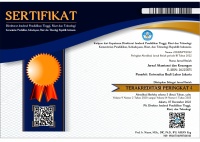DAMPAK ISLAMIC CORPORATE SOCIAL REPORTING DAN STRUKTUR KEPEMILIKAN TERHADAP PENGHINDARAN PAJAK
Abstract
This quantitative study aims to examine the impact of Islamic Corporate Social Responsibility (ICSR) and ownership structure on tax avoidance. The research population consists of companies listed on the Jakarta Islamic Index (JII) for the period 2019-2023, with a sample of 60 companies selected using purposive sampling. The structural model was tested using the SmartPLS application. The results indicate that ICSR, managerial ownership, and government ownership have a negative effect on tax avoidance. Conversely, foreign ownership and institutional ownership do not have a significant impact on tax avoidance. The negative influence of ICSR and managerial ownership suggests that companies applying Islamic values and having strict oversight tend to be more compliant with tax obligations. On the other hand, the lack of significance for foreign and institutional ownership may be due to a focus on profitability and limited involvement in tax policies.
Keywords
Full Text:
PDFReferences
Alkurdi, A., & Mardini, G. H. (2020). The impact of ownership structure and the board of directors’ composition on tax avoidance strategies: Empirical evidence from Jordan. Journal of Financial Reporting and Accounting, 18 (4), 795–812. Scopus. https://doi.org/10.1108/JFRA-01-2020-0001.
Alsaadi, A. (2020). Financial-tax reporting conformity, tax avoidance and corporate social responsibility. Journal of Financial Reporting and Accounting, 18 (3). https://doi.org/10.1108/jfra-10-2019-0133.
Apriliani, L., & Wulandari, S. (2023). Pengaruh Koneksi Politik, Kepemilikan Manajerial dan Pertumbuhan Penjualan terhadap Penghindaran Pajak. J-MAS (Jurnal Manajemen Dan Sains), 8 (1), Article 1. https://doi.org/10.33087/jmas.v8i1.902
Apriliyana, N.-, & Suryarini, T. (2018). The Effect Of Corporate Governance and the Quality of CSR to Tax Avoidation. Accounting Analysis Journal, 7 (3), Article 3. https://doi.org/10.15294/aaj.v7i3.20052.
Arifin, J., & Wardani, E. A. (2016). Islamic corporate social responsibility disclosure, reputasi, dan kinerja keuangan: Studi pada bank syariah di Indonesia. Jurnal Akuntansi Dan Auditing Indonesia, 20 (1), Article 1. https://doi.org/10.20885/jaai.vol20.iss1.art4.
Badertscher, B. A., Katz, S. P., & Rego, S. O. (2013). The separation of ownership and control and corporate tax avoidance. Journal of Accounting and Economics, 56 (2), 228–250. https://doi.org/10.1016/j.jacceco.2013.08.005.
Bird, A., & Karolyi, S. A. (2017). Governance and Taxes: Evidence from Regression Discontinuity. The Accounting Review, 92 (1), 29–50.
Board Meeting Attendance and Corporate Tax Avoidance: Evidence from the UK - Victor Barros, Joaquim Miranda Sarmento, 2020. (t.t.). Diambil 20 Agustus 2024, dari https://journals.sagepub.com/doi/abs/10.1177/2278533719860021?journalCode=bpra
Bradshaw, M., Liao, G., & Ma, M. (Shuai). (2019). Agency costs and tax planning when the government is a major Shareholder. Journal of Accounting and Economics, 67 (2), 255–277. https://doi.org/10.1016/j.jacceco.2018.10.002.
Cabello, O. G., Gaio, L. E., Link to external site, this link will open in a new tab, & Watrin, C. (2019). Tax avoidance in management-owned firms: Evidence from Brazil. International Journal of Managerial Finance, 15 (4), 580–592. https://doi.org/10.1108/IJMF-04-2018-0117.
Ceyhan, S., & Barca, M. (2021). Agency perspective in Islamic political treatises: Implications for contemporary management research. International Journal of Emerging Markets. https://doi.org/10.1108/ijoem-01-2021-0103.
Chan, K. H., Mo, P. L. L., & Zhou, A. Y. (2013). Government ownership, corporate governance and tax aggressiveness: Evidence from China. Accounting & Finance, 53 (4), 1029–1051. https://doi.org/10.1111/acfi.12043.
Dakhli, A. (2021). The impact of ownership structure on corporate tax avoidance with corporate social responsibility as mediating variable. Journal of Financial Crime, 29 (3), 836–852. https://doi.org/10.1108/JFC-07-2021-0152.
Dewi, R. R., & Gunawan, I. D. (2019). The Implications Of CSR And GCG On Tax Avoidance. Jurnal Akuntansi, 23 (2), Article 2. https://doi.org/10.24912/ja.v23i2.577.
Dusuki, A. W., & Abdullah, N. I. (2007). Maqasid al-Shari`ah, Maslahah, and Corporate Social Responsibility. American Journal of Islam and Society, 24 (1), 25–45. https://doi.org/10.35632/ajis.v24i1.415.
Farook, S., Kabir Hassan, M., & Lanis, R. (2011). Determinants of corporate social responsibility disclosure: The case of Islamic banks. Journal of Islamic Accounting and Business Research, 2 (2), 114–141. https://doi.org/10.1108/17590811111170539.
Goerke, L. (2018). Corporate Social Responsibility and Tax Avoidance (SSRN Scholarly Paper 3338623). https://doi.org/10.2139/ssrn.3338623.
Gulzar, M. A., Cherian, J., Sial, M. S., Badulescu, A., Thu, P. A., Badulescu, D., & Khuong, N. V. (2018). Does Corporate Social Responsibility Influence Corporate Tax Avoidance of Chinese Listed Companies? Sustainability, 10 (12), Article 12. https://doi.org/10.3390/su10124549.
Hadi, J., & Mangoting, Y. (2014). PENGARUH STRUKTUR KEPEMILIKAN DAN KARAKTERISTIK DEWAN TERHADAP AGRESIVITAS PAJAK. Tax & Accounting Review, 4 (2), Article 2. https://publication.petra.ac.id/index.php/akuntansi-pajak/article/view/3937.
Haniffa, R., & Hudaib, M. (2007). Exploring the Ethical Identity of Islamic Banks via Communication in Annual Reports. Journal of Business Ethics, 76 (1), 97–116.
Haryanto, S. D., Ditasari, R. A., & Amalina, N. A. (2023). Apakah corporate tax avoidance meningkatkan firm value perusahaan di Indonesia? FISCAL: Jurnal Akuntansi dan Perpajakan, 1(1), Article 1. https://doi.org/10.25273/jap.v1i1.15333.
Hasan, T., John, K., Teng, H., & Wu, Q. (2023). Creative corporate culture and corporate tax avoidance. The British Accounting Review, 101217. https://doi.org/10.1016/j.bar.2023.101217.
Hidayat, K., & Zuhroh, D. (2023). The Impact of Environmental, Social and Governance, Sustainable Financial Performance, Ownership Structure, and Composition of Company Directors on Tax Avoidance: Evidence from Indonesia. International Journal of Energy Economics and Policy, 13 (6), 311–320. Scopus. https://doi.org/10.32479/ijeep.14557.
Hilling, A., Lundtofte, F., Sandell, N., Sonnerfeldt, A., & Vilhelmsson, A. (2021). Tax avoidance and state ownership—The case of Sweden. Economics Letters, 208, 110063. https://doi.org/10.1016/j.econlet.2021.110063.
Honggowati, S., Rahmawati, R., Aryani, Y. A., & Probohudono, A. N. (2019). Strategic Management Accounting disclosure, ownership structure, and firm characteristics in Indonesia manufacturing companies. Jurnal Keuangan Dan Perbankan, 23 (3), Article 3. https://doi.org/10.26905/jkdp.v23i3.3228.
Jiang, Y., Zheng, H., & Wang, R. (2021). The effect of institutional ownership on listed companies’ tax avoidance strategies. Applied Economics, 53 (8), 880–896. https://doi.org/10.1080/00036846.2020.1817308.
Khan, M., Srinivasan, S., & Tan, L. (2017a). Institutional ownership and corporate tax avoidance: New evidence. Accounting Review, 92 (2), 101–122. Scopus. https://doi.org/10.2308/accr-51529.
Khan, M., Srinivasan, S., & Tan, L. (2017b). Institutional Ownership and Corporate Tax Avoidance: New Evidence. The Accounting Review, 92 (2), 101–122. https://doi.org/10.2308/accr-51529.
Kuo, J.-S., Ho, Y.-C., & Lin, H.-S. (2020). Institutional ownership and tax avoidance: Evidence from regression discontinuity. Academia Economic Papers, 48 (1), 105–149. Scopus.
Liu, H., & Lee, H. (2019). The effect of corporate social responsibility on earnings management and tax avoidance in Chinese listed companies. International Journal of Accounting &Amp; Information Management, 27 (4). https://doi.org/10.1108/ijaim-08-2018-0095.
Mohammed, S. A. S. A., & Muhammed, J. (2017). The relationship between agency theory, stakeholder theory and Shariah supervisory board in Islamic banking. Humanomics, 33, 75–83. https://doi.org/10.1108/H-08-2016-0062.
Munisi, G., Hermes, N., & Randøy, T. (2014). Corporate boards and ownership structure: Evidence from Sub-Saharan Africa. International Business Review, 23 (4), 785–796. https://doi.org/10.1016/j.ibusrev.2013.12.001.
Ninow, L., Thunecke, G., & Wagner, M. (2021). Evidence on Aggressive Tax Avoidance by German State-Owned Enterprises and its Driving Factors. German Politics, 30 (4), 541–561. https://doi.org/10.1080/09644008.2020.1814258.
Permatasari, M., Melyawati, M., Firmansyah, A., & Trisnawati, E. (2021). Peran Konsentrasi Kepemilikan: Respon Investor, Penghindaran Pajak, Manajemen Laba. Studi Akuntansi Dan Keuangan Indonesia, 4 (1), Article 1. https://doi.org/10.21632/saki.4.1.17-29.
Prasetyo, A. W., & Primasari, N. H. (2021). Pengaruh Komisaris Independen, Pertumbuhan Penjualan, Profitabilitas, Leverage dan Ukuran Perusahaan Terhadap Tax Avoidance. Jurnal Akuntansi dan Keuangan, 10 (1), Article 1. https://doi.org/10.36080/jak.v10i1.1427.
Primasari, N. H. (2019). Leverage, Ukuran Perusahaan, Profitabilitas, Pertumbuhan Penjualan, Proporsi Komisaris Independen dan Kualitas Audit Terhadap Tax Avoidance (Studi Empiris pada Perusahaan Manufaktur yang terdaftar di Bursa Efek Indonesia Periode 2014-2016). Jurnal Akuntansi dan Keuangan, 8 (1), Article 1. https://doi.org/10.36080/jak.v8i1.838.
Putra, Z. K. P., & Suhardianto, N. (2020). The Influence of Political Connection on Tax Avoidance. Jurnal Akuntansi Dan Keuangan, 22 (2), Article 2. https://doi.org/10.9744/jak.22.2.82-90.
Rashid, Md. H. U., Begum, F., Hossain, S. Z., & Said, J. (2023). Does CSR affect tax avoidance? Moderating role of political connections in Bangladesh banking sector. Social Responsibility Journal, ahead-of-print(ahead-of-print). https://doi.org/10.1108/SRJ-09-2022-0364
Richardson, G., Wang, B., & Zhang, X. (2016). Ownership structure and corporate tax avoidance: Evidence from publicly listed private firms in China. Journal of Contemporary Accounting & Economics, 12 (2), 141–158. https://doi.org/10.1016/j.jcae.2016.06.003.
Riguen, R., Salhi, B., & Jarboui, A. (2020). Do women in board represent less corporate tax avoidance? A moderation analysis. International Journal of Sociology and Social Policy, 40 (1/2), 114–132. https://doi.org/10.1108/IJSSP-10-2019-021.
Safieddine, A. (2009). Islamic Financial Institutions and Corporate Governance: New Insights for Agency Theory. Wiley-Blackwell: Corporate Governance: An International Review. https://doi.org/10.1111/j.1467-8683.2009.00729.x
Wang, J., & Lu, J. (2021). Religion and corporate tax compliance: Evidence from Chinese Taoism and Buddhism. Eurasian Business Review, 11 (2), 327–347.
Winarno, W. A., Kustono, A. S., Effendi, R., Mas’ud, I., & Wardhaningrum, O. A. (2021). Corporate Social Responsibility and Tax Avoidance: Evidence from Indonesia. AKRUAL: Jurnal Akuntansi, 13 (1), Article 1. https://doi.org/10.26740/jaj.v13n1.p69-82.
Wiranata, Y. A., & Nugrahanti, Y. W. (2013). Pengaruh Struktur Kepemilikan Terhadap Profitabilitas Perusahaan Manufaktur di Indonesia. Jurnal Akuntansi Dan Keuangan, 15 (1), Article 1. https://doi.org/10.9744/jak.15.1.15-26.
Ying, T., Wright, B., & Huang, W. (2017). Ownership structure and tax aggressiveness of Chinese listed companies. International Journal of Accounting & Information Management, 25(3), 313–332. https://doi.org/10.1108/IJAIM-07-2016-0070.
Zeng, T. (2011). Institutional environment, inside ownership and effective tax rate. Nankai Business Review International, 2 (4), 348–357. https://doi.org/10.1108/20408741111178799.
Zeng, T. (2018). Relationship between corporate social responsibility and tax avoidance: International evidence. Social Responsibility Journal, 15 (2), 244–257. https://doi.org/10.1108/SRJ-03-2018-0056
DOI: https://doi.org/10.36080/jak.v13i2.3290
Refbacks
- There are currently no refbacks.

This work is licensed under a Creative Commons Attribution 4.0 International License.
Fakultas Ekonomi dan Bisnis, Program Studi Akuntansi. Universitas Budi Luhur, Jl. Ciledug Raya, Petukangan Utara, Jakarta Selatan, DKI Jakarta 12260, Indonesia

This work is licensed under a Creative Commons Attribution 4.0 International License.












